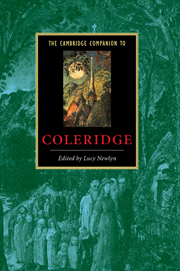10 - Political thinker
from Part II - Discursive modes
Published online by Cambridge University Press: 28 May 2006
Summary
Throughout his life, S. T. Coleridge was a politically engaged thinker. From his student days as an undergraduate at Jesus College, Cambridge, when he participated in agitation in support of his hero, William Frend, to his later years as the 'Sage of Highgate' criticising the pervasion of materialist thinking and commercial ethics through all aspects of life, Coleridge was a deeply political man. His writings reveal him as someone who closely followed the contemporary political scene as it unfolded during one of the most turbulent and exciting periods in the nation's history, a man steeped in the leading ideas of European political philosophy. Coleridge gave political lectures, wrote leaders, essays and editorials for the press, in which he commented on the major issues of the time, published journals full of political comment, and produced three substantial political treatises. As a young man he published sonnets on key political figures of the time, such as Burke, Pitt, Priestley and William Godwin; poems of political and religious dissent; and a number of poems about his response to the French Revolution, most notably 'Fears in Solitude' and 'France: An Ode'. All this is remarkable in a writer known chiefly as the composer of several of the greatest poems in the English language.
- Type
- Chapter
- Information
- The Cambridge Companion to Coleridge , pp. 156 - 169Publisher: Cambridge University PressPrint publication year: 2002
- 2
- Cited by



